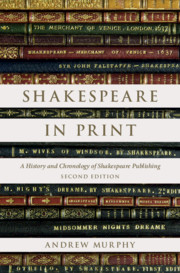Book contents
- Shakespeare in Print
- Shakespeare in Print
- Copyright page
- Dedication
- Contents
- Illustrations
- Tables
- Acknowledgements
- Preface to the Second Edition
- Abbreviations
- Part I Text
- Introduction
- Chapter 1 Bringing Shakespeare to Print
- Chapter 2 Collecting Shakespeare
- Chapter 3 The Tonson Era 1
- Chapter 4 The Tonson Era 2
- Chapter 5 Copyright Disputes
- Chapter 6 Copyright disputes
- Chapter 7 American Editions
- Chapter 8 Nineteenth-Century Popular Editions
- Chapter 9 Nineteenth-Century Scholarly Editions
- Chapter 10 The New Bibliography
- Chapter 11 Shakespeare in the Modern Era
- Chapter 12 Shakespeare beyond Print
- Appendix
- Index 1
- Index 2
- Index 3
- Index 4
- Index 5
- Notes
- Bibliography
- Main Index
Chapter 10 - The New Bibliography
from Part I - Text
Published online by Cambridge University Press: 23 April 2021
- Shakespeare in Print
- Shakespeare in Print
- Copyright page
- Dedication
- Contents
- Illustrations
- Tables
- Acknowledgements
- Preface to the Second Edition
- Abbreviations
- Part I Text
- Introduction
- Chapter 1 Bringing Shakespeare to Print
- Chapter 2 Collecting Shakespeare
- Chapter 3 The Tonson Era 1
- Chapter 4 The Tonson Era 2
- Chapter 5 Copyright Disputes
- Chapter 6 Copyright disputes
- Chapter 7 American Editions
- Chapter 8 Nineteenth-Century Popular Editions
- Chapter 9 Nineteenth-Century Scholarly Editions
- Chapter 10 The New Bibliography
- Chapter 11 Shakespeare in the Modern Era
- Chapter 12 Shakespeare beyond Print
- Appendix
- Index 1
- Index 2
- Index 3
- Index 4
- Index 5
- Notes
- Bibliography
- Main Index
Summary
The New Bibliography represents one of the most important developments in the history of Shakespeare editing. Those associated with the movement – most especially W. W. Greg, R. B. McKerrow and A. W. Pollard – aimed to bring a scientific mindset to the business of examining, theorising about and editing early modern texts. Much of their early work provided significant breakthroughs in bibliographic knowledge. Their more speculative ideas – including the division of early single play texts into 'good' and 'bad' quartos; 'memorial reconstruction'; proposed differences between foul paper manuscripts and prompt books – have proved controversial in the long run, but have nevertheless, for the past century, served as the bedrock for techniques for editing early modern texts. The history of these ideas is mapped out here. The chapter concludes with an extended consideration of two projects spawned by the New Bibliography: the Oxford Shakespeare, which ultimately ran into the sand, despite repeated efforts to revive it, and the New Cambridge Shakespeare, which was brought successfully to completion by John Dover Wilson.
Keywords
- Type
- Chapter
- Information
- Shakespeare in PrintA History and Chronology of Shakespeare Publishing, pp. 258 - 290Publisher: Cambridge University PressPrint publication year: 2021
- 1
- Cited by



